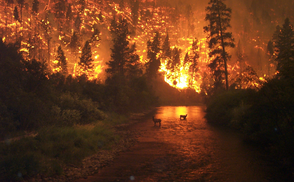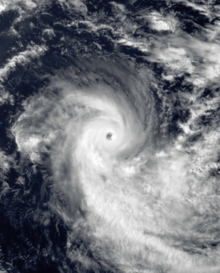
The following is a list of weather events that occurred on Earth in the year 2000. There were several natural disasters around the world from various types of weather, including floods, droughts, heat waves, tornadoes, and tropical cyclones. The deadliest disaster were the 2000 Mozambique Floods which killed 800 people, and the costliest event of the year was Typhoon Saomai, which caused $6.3 billion (2000 USD) in damages.
| Weather year articles (2000–2009) |
|---|
| 2000, 2001, 2002, 2003, 2004, 2005, 2006, 2007, 2008, 2009 |
Winter storms and cold waves
In January, an extremely powerful and historic blizzard, commonly referred to as the Carolina Crusher, hit parts of North Carolina and Central Virginia on January 25, causing thousands of power outages within the area leaving 11 inches of snow in Richmond, VA and 20.3 inches in Raleigh-Durham International Airport before moving out to the Atlantic.
In December, a significant nor'easter impacted the Mid-Atlantic and New England regions of the United States around the end of the month. It began as an Alberta clipper that moved southeastward through the central United States and weakened over the Ohio Valley. The storm dropped heavy precipitation throughout the Northeast, especially in northern New Jersey and eastern New York, where snowfall often exceeded 2 ft (0.61 m). Even so, as it struck on a weekend, its effects were generally minor and mostly limited to travel delays, traffic accidents, and business closures.
Droughts, heat waves, and wildfires
The 2000 California wildfire season produced multiple wildfires, killing 1 or more people and injuring multiple others. Over 130 buildings were destroyed during the season, amounting to $154 million (2000 USD) in damages. The Storrie Fire on August 17 caused $22 million (2000 USD) in damages, and burned 55,261 acres of land.
In August and September, a large heat wave affected parts of the southern United States, with highs commonly peaking well over 100 °F.
Floods

In February and March, a large and deadly flood in Mozambique killed 800 people. The flood caused $500 million (2000 USD) in damages, and is one of Mozambique's worst-ever floods.
The Autumn of 2000 was the wettest recorded in the United Kingdom since records began in 1766. Several regions of Atlantic Europe from France to Norway received double their average rainfall and there were severe floods and landslides in the southern Alps.
The United Kingdom saw the most extensive nationwide flooding event since the snow-melt of 1947. Prior to 1947, three similar events occurred in the second half of the 19th century where prolonged rainfall led to widespread flooding throughout England in the month of November, in 1894, 1875, and 1852.
In November, a catastrophic flood occurred in Hawaii. The floods led to $70 million (2000 USD) in damage, but there were no fatalities. The flood was indirectly triggered by Tropical Storm Paul.
Tornadoes
Main article: Tornadoes of 2000There were 1,075 tornadoes in the United States alone, collectively resulting in 41 deaths.
- On February 13 and 14, a deadly tornado outbreak killed 18 people, caused 23 injuries and caused more than $20 million (2000 USD) in damages. It was the single deadliest tornado outbreak in the United States between June 1999 and October 2002.
- On March 28, a small but deadly tornado outbreak caused extensive damage in downtown Fort Worth, Texas, causing damage to skyscrapers and other buildings. 2 people were killed by this tornado, and 80 more were injured. $450 million (2000 USD) were recorded. Another F3 tornado touched down as part of the outbreak, but caused little damage and no injuries.
- On April 23, a tornado outbreak produced 33 tornadoes across Oklahoma, Texas, Arkansas, and Louisiana, with three of these being rated F3. An F1 tornado moved through Shreveport, Louisiana, injuring six people and causing $10,000+ (2000 USD) in damages. In total, 12 people were injured, but no fatalities were recorded.
- On May 11 and 12, an F3 tornado killed one person near Cedar Falls, Iowa. Another F3 tornado caused two fatalities in Laguna Park, Texas.
- On May 17 and 18, a small storm system produced 69 tornadoes. One tornado was rated F3, and caused damage to multiple buildings. 2 people were injured.
- On July 14 an F3 tornado touched down and moved toward Green Acres Campground at Pine Lake, Alberta. 12 people at the campground were killed and over 100 were injured. Winds of up to 300 km/h (190 mph) caused $15.2 million (2000 Canadian dollars) in damage to the campground. It was the fourth-deadliest tornado in Canadian history.
- On July 25, a small outbreak produced 12 tornadoes, one of which was a violent tornado that hit the city of Granite Falls in Yellow Medicine County, and the tornado killed one person and injured 15 others. It is one of the strongest tornadoes in Minnesota history.
- On September 20, an F4 tornado struck Xenia, Ohio, killing 1 person and injuring 100 others. The tornado damaged over 150 homes.
- On December 16, a mid-sized outbreak produced 24 tornadoes, and an F4 tornado in Tuscaloosa, Alabama killed 11 people and injured 144. It was the strongest tornado to hit Alabama since 1950.
Tropical cyclones
See also: Tropical cyclones in 2000
During 2000, tropical cyclones formed in seven different areas called basins, located within various parts of the Atlantic, Pacific, and Indian Oceans. A total of 140 tropical cyclones formed within bodies of water known as tropical cyclone basins, with 81 of them being further named by their responsible weather agencies when they attained maximum sustained winds of 35 knots (65 km/h; 40 mph). The strongest storm of the year was Cyclone Hudah, peaking with a minimum pressure of 905 hPa (26.72 inHg), and with 10-minute sustained winds of 220 km/h (135 mph). The highest confirmed number of deaths from a storm was from Typhoon Kai-tak, which killed 188 people, however, Leon–Eline may have killed up to 722 people. The costliest storm was Saomai, which caused $6.3 billion in damage. The accumulated cyclone energy (ACE) index for the 2000 (seven basins combined), as calculated by Colorado State University was 677.3 units.
There was an above-average number of storms during the year; the most active basin of the year was the Western Pacific, where a below-average 23 named storms formed. The Eastern Pacific and the North Atlantic were both relatively above-average, with 19 named storms forming in the Eastern Pacific and 15 in the North Atlantic. The Southern Hemisphere was also relatively average. Three Category 5 tropical cyclones were formed in 2000.
References
- ^ "Mozambique Floods, 2000 – FloodList". floodlist.com. Retrieved 2024-05-11.
- ^ "China army helps typhoon clear-up". 2006-08-12. Retrieved 2024-05-11.
- "Notable Winter Storms - Products | North Carolina State Climate Office". 2023-05-11. Retrieved 2024-05-11.
- McFadden, Robert D. (2000-12-31). "THE BLIZZARD OF 2000: THE OVERVIEW; Blizzard Buries New York, Slowing Region to a Crawl". The New York Times. ISSN 0362-4331. Retrieved 2024-05-11.
- "California Wildfire History Map". capradio.org. Retrieved 2024-05-11.
- "Storrie Fire Reforestation". California Forest Carbon Coalition. Retrieved 2024-05-11.
- "Summer (JJA) 2000 Drought Report | National Centers for Environmental Information (NCEI)". www.ncei.noaa.gov. Retrieved 2024-05-11.
- "As much of US swelters, here are 5 worst heat waves of past 30 years". Christian Science Monitor. ISSN 0882-7729. Retrieved 2024-05-11.
- Hudson, Paul. "BBC - Paul Hudson's Weather & Climate Blog: The 10th anniversary of the Autumn 2000 floods". www.bbc.co.uk. Retrieved 2024-05-11.
- Howe, Joe; White, Iain (2002). "The Geography of the Autumn 2000 Floods in England and Wales: Causes and Solutions". Geography. 87 (2): 116–124. ISSN 0016-7487.
- Shute, Megan (2019-03-27). "In 2000, A Massive Flood Swept Through Hawaii That No One Can Ever Forget". OnlyInYourState®. Retrieved 2024-05-11.
- US Department of Commerce, NOAA. "SOUTHWEST GEORGIA TORNADO OUTBREAK OF 13-14 FEBRUARY 2000". www.weather.gov. Retrieved 2024-05-11.
- ^ "2000 fort worth tornado - Google Search". www.google.com. Retrieved 2024-05-11.
- US Department of Commerce, NOAA. "April 23, 2000: Easter Sunday Tornado Outbreak". www.weather.gov. Retrieved 2024-05-11.
- slt (2000-05-11). "May 11th, 2000 Waterloo & Blackhawk County, Iowa -". Retrieved 2024-05-11.
- Today, U. S. A. "EF3 tornado on May. 11, 2000 18:03 PM CDT". USA Today. Retrieved 2024-05-11.
- ^ Coloradoan, Fort Collins. "EF0 tornado on May. 17, 2000 13:47 PM MDT". Fort Collins Coloradoan. Retrieved 2024-05-11.
- Chronicle, The Augusta. "Tornado on May. 17, 2000 17:15 PM CDT". The Augusta Chronicle. Retrieved 2024-05-11.
- ^ "IN PHOTOS: A look back at the Pine Lake tornado 20 years later | Globalnews.ca". Global News. Retrieved 2024-05-11.
- Corp, Pelmorex (2021-07-14). "Canada's fourth-deadliest tornado tore up a campsite near Red Deer, Alberta". The Weather Network. Retrieved 2024-05-11.
- US Department of Commerce, NOAA. "This Day in Weather History: July 25th". www.weather.gov. Retrieved 2024-05-11.
- US Department of Commerce, NOAA. "September 20th, 2000 Xenia F4 Tornado". www.weather.gov. Retrieved 2024-05-11.
- US Department of Commerce, NOAA. "Tuscaloosa Tornado - December 16, 2000". www.weather.gov. Retrieved 2024-05-11.
- "El Niņo and La Niņa Years and Intensities". 2021-02-10. Archived from the original on 2021-02-10. Retrieved 2021-02-11.
- NOAA: 2000 Atlantic hurricane outlook. Climate Prediction Center (Report). National Oceanic and Atmospheric Administration. May 10, 2000. Retrieved January 26, 2008.
- "Climate Prediction Center – Expert Assessments: Atlantic Hurricane Outlook". www.cpc.ncep.noaa.gov. Retrieved 2021-02-07.
- "CNN.com - La Niña is dying. Or is it? - May 9, 2000". edition.cnn.com. Retrieved 2021-02-11.
| Global weather by year | ||
|---|---|---|
| Preceded by 1999 |
Weather of 2000 |
Succeeded by 2001 |